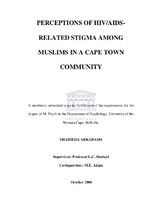| dc.contributor.advisor | Simbayi, Leickness | |
| dc.contributor.author | Abrahams, Shahieda | |
| dc.contributor.other | Dept. of Psychology | |
| dc.contributor.other | Faculty of Community and Health Sciences | |
| dc.date.accessioned | 2013-08-07T13:07:28Z | |
| dc.date.available | 2007/06/15 07:50 | |
| dc.date.available | 2007/07/20 | |
| dc.date.available | 2013-08-07T13:07:28Z | |
| dc.date.issued | 2006 | |
| dc.identifier.uri | http://hdl.handle.net/11394/1854 | |
| dc.description | Magister Psychologiae - MPsych | en_US |
| dc.description.abstract | South Africa has the largest percentage of people living with HIV/AIDS in the world. However, the response against the further spread of HIV/AIDS in the country is being hindered by stigma and discrimination. In order to develop effective intervention programmes to control and reduce the further spread of the disease, it is first important to understand the nature of HIV/AIDS-related stigma and especially how people construct it. In the present study, the social construction of HIV/AIDS-related stigma among Muslims was investigated because high levels of stigma were found in this group. This was fuelled partly by the belief that HIV/AIDS was not a serious problem amongst Muslims. Two focus groups were conducted, one among Muslim women only and the second among Muslim men only. The main aim of the study was to examine the perceptions of HIV/AIDS-related stigma among Muslims. The transcripts were analyzed using thematic content analysis to determine the themes that emerged from the research material. The main findings of the study included that Muslims’ religious identity/positioning was the most salient discourse that informed how they understood, made meaning of, and responded to HIV/AIDS. They engaged in various forms of stigma such as ‘othering’, and mediating factors of stigma included religious positioning. Stigma also served as a social barrier to VCT and disclosure of HIV status. However, supportive attitudes and behaviours were also evident. The findings yielded useful insights into possible elements of intervention programmes, both to reduce HIV/AIDS-related stigma, and also to encourage behavioural change in order to control and reduce the spread of HIV/AIDS in this community. | en_US |
| dc.language.iso | en | en_US |
| dc.publisher | University of the Western Cape | en_US |
| dc.subject | HIV (Viruses) | en_US |
| dc.subject | Muslim Women - South Africa | en_US |
| dc.subject | Cape Town | en_US |
| dc.subject | HIV infections | en_US |
| dc.subject | AIDS (Disease) | en_US |
| dc.subject | AIDS (Disease) in women | en_US |
| dc.subject | Social aspects | en_US |
| dc.subject | Religious aspects - Islam | en_US |
| dc.subject | Moral and ethical aspects | en_US |
| dc.subject | Ethnology | en_US |
| dc.subject | Positive Muslims | en_US |
| dc.title | Perceptions of HIV/AIDS-related stigma among Muslims in a Cape Town community | en_US |
| dc.type | Thesis | en_US |
| dc.rights.holder | University of the Western Cape | en_US |
| dc.description.country | South Africa | |

